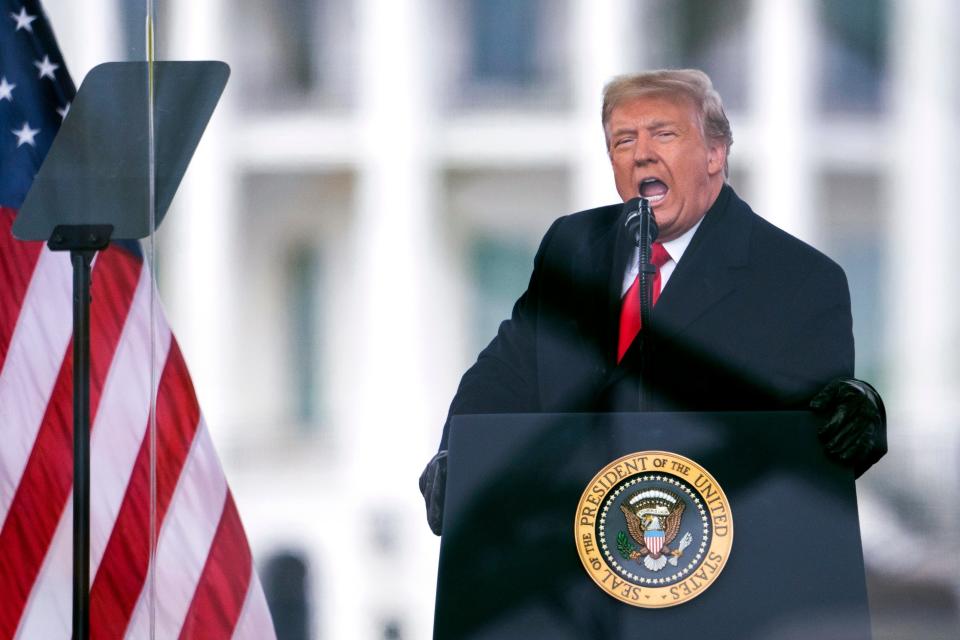What is the 14th Amendment? What is Section 3? What to know as SCOTUS hears Trump's appeal
- Oops!Something went wrong.Please try again later.
On Thursday, the U.S. Supreme Court will hear former President Donald Trump's appeal to a Colorado ruling that removed him from the presidential primary ballot due to his role in the Jan. 6, 2021 riots at the U.S. Capitol.
In the December 4-3 vote, the Colorado Supreme Court ruled that Trump is disqualified from the race because of the 14th Amendment, Section 3. The post-Civil War-era provision bars anyone who has "engaged in insurrection" from holding office again.
Similar legal challenges to Trump's candidacy have been filed around the country, and Maine's Democratic secretary of state has ruled that he is ineligible for the ballot.
The ruling could have huge implications in this year's presidential election; if the justices reject Trump's arguments and uphold Colorado's decision, other states would be able to follow suit and remove him from the ballot.
Here is what to know about the Constitutional provision the arguments will hinge on.
Live updates: Follow Trump's case at Supreme Court
Trump's Supreme Court appeal: 5 arguments the former president can make in 14th amendment case

What is the 14th Amendment?
The 14th Amendment to the U.S. Constitution was passed in the post-Civil War era, intended to extend liberties in the Bill of Rights to formerly enslaved people. It was passed by Congress in June 1866 and ratified July 1868.
It also established the right of due process at the state level.
The 14th Amendment was thrust into public debate in recent years when the U.S. Supreme Court overturned Roe v. Wade. The due process clause in the 14th Amendment has been used to defend the right to privacy, a key argument in the 1973 Roe v. Wade ruling protecting the right to an abortion.
Nevada primary takeaways: 'None' beats Haley. Trump wasn't on GOP ballot. Biden wins Dems
14th Amendment, Section 3 full text: What does it say about insurrection?
Section 3 of the 14th Amendment is where debate about Trump's alleged involvement in the Jan. 6 Capitol riots lies.
No person shall be a Senator or Representative in Congress, or elector of President and Vice-President, or hold any office, civil or military, under the United States, or under any State, who, having previously taken an oath, as a member of Congress, or as an officer of the United States, or as a member of any State legislature, or as an executive or judicial officer of any State, to support the Constitution of the United States, shall have engaged in insurrection or rebellion against the same, or given aid or comfort to the enemies thereof. But Congress may by a vote of two-thirds of each House, remove such disability.
In summary, it bars anyone who has engaged in insurrection after swearing to uphold the constitution (by being sworn into office, for example), from holding office again.
Previously: Maine removes Trump from ballot, saying he's disqualified by 'insurrectionist ban'
14th Amendment, Section 3 and Trump's 2024 presidential run
Colorado's lawsuit was one of several across the country that invoked Section 3 of the 14th Amendment to say that Trump is disqualified from being president again.
His lawyers argue that it was never meant to apply to the office of the presidency, which is not mentioned directly, unlike "Senator or Representative in Congress" in Section 3.
Lawyers for plaintiff and watchdog group Citizens for Responsibility and Ethics in Washington have argued that Trump's efforts to overturn the results of the 2020 election, including his involvement with the Jan. 6, 2021, attack on the U.S. Capitol, mean he engaged in insurrection. He has been indicted by a federal grand jury for conspiracy and obstruction. The indictment alleges that Trump directed his supporters to march to the Capitol.
A lower court judge initially ruled in November that Trump would stay on the primary ballot. While Colorado District Judge Sarah Wallace found Trump "engaged in an insurrection," she determined that Section 3 of the 14th Amendment did not apply to a president.
The Colorado Supreme Court reversed that ruling.
"We do not reach these conclusions lightly," the court wrote. "We are mindful of the magnitude and weight of the questions now before us. We are likewise mindful of our solemn duty to apply the law, without fear or favor, and without being swayed by public reaction to the decisions that the law mandates we reach."
The court stayed its ruling until January, giving Trump time to appeal to the U.S. Supreme Court.
Contributing: Maureen Groppe, Sudiksha Kochi, John Fritze, Aysha Bagchi, David Jackson, Orlando Mayorquin
This article originally appeared on USA TODAY: What is the 14th Amendment, Section 3? Full text; what to know

